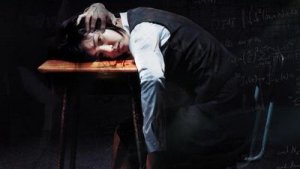 EXO's Chen Welcomes His First Child
EXO's Chen Welcomes His First Child
Warning
This article is going to contain spoilers, mistakes but also potentially life-saving advice.
If you're one of those people who once they know of a mistake, it spoils an entire drama or film for them, this article might not be for you. This article, however, may also give you some life-saving advice one day in the future, so it's up to you if you wish to continue (reading) this article or not. The spoilers are also not going to be blacked out unless it's something that reveals a severe plot point. Minor spoilers will be present throughout the article.
I will also preface this article by saying that some of my family work in the medical field. I have been surrounded by medical my entire life; I have also spent a great deal of my life in hospital and to pass time, I'd often talk to nurses and doctors about content like this. I essentially co-wrote this with my family members, asking their opinions on things and having them verify all information before this was submitted, and also did a great deal of research. Everything in this article I have 100% verified as true - if it could only be verified 99%, it has not been included. Resources can be found at the bottom. I myself am also a trained emergency line operator.
This contains spoilers for: Ouran Host High School Club, The Eye (2002), While You Were Sleeping, Descendants of the sun
This contains mild spoilers for: Life, Witch's Love
I love a good medical drama. I love any good drama with some medical drama that make you get nervous. The anxious tension in the hospitals, the drama, the life-threatening situations that have me on the edge of my seat make for a good time. However, the misophobic mess that I am has noticed a large and vast area of mistake that a lot of medical dramas make - both Asian and American.
Now, we all know medical dramas and that most medical advice and situations shown in any dramas are fake, correct? They're not top of the range life saving medical advice that is going to save you when you're getting chest pains.
We all know that in this day and age.
However, countless people die a year due to simple mistakes they make because they saw something in a drama or a show or a movie and they think it's the right thing to do, either in panic or they think the show was properly researched. People get chest pains and think of Grey's Anatomy, or they get some glass stuck in themselves and think what would Jin Woo in Life do or they get bitten by an animal and don't remember what Descendants of the Sun said to do so they just leave it.
Usually, this is done in panic, due to the brain doing its best to remember its one job: survive.
In fact, medical shows are one of the most incorrect shows that are out there. If you followed half the advice in a Korean drama or that Japanese film, you're probably going to die before you can dial 911.
I've noticed a lot of different mistakes made in my time watching films and the few dramas I have, so today, I wanted to sit back and correct some deadly mistakes. I hope no one ever needs to use this advice, but if a situation should occur, I do hope that this article comes back to you in a time of need.
Put the pitchforks down, I genuinely wrote this majorly with public health in mind as a concern after watching so many dramas have ruined CPR.
Next up, let's talk about something that has actually caused the death of countless people worldwide: stabbing.
Now when I say "the cause of death" I don't mean the stabbing itself. I mean this idiotic move that films and shows love to pull:
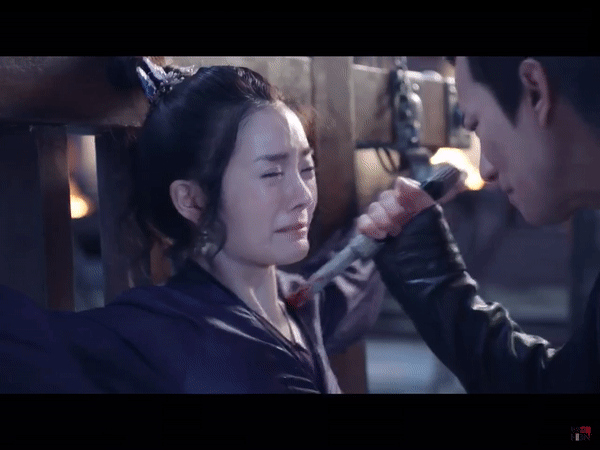 Cinderella Chef (2018) - episode unsure Cinderella Chef (2018) - episode unsure |
MEDICAL ADVICE: My dear, dear readers, if you ever have been stabbed, have fallen over and landed on a nail causing it to stick into your leg, caught yourself on broken glass and you have some sticking out your arm, anything of the sort. DO NOT REMOVE IT. Keep it where it is and immediately seek hospital assistance.
This is for one very simple reason: the object could be stopping you from bleeding out.
Say in the scenario you've been stabbed in the leg. This knife has gone through your artery. You're still bleeding, but it's periodical of some blood seeping out from between the knife. Now, your arteries transfer a very high volume of blood through your body - think of how quickly people bleed out when the artery in their vein gets even slightly nicked. This is the same for all of your arteries. Now, whilst that wound in your leg is still bleeding, there's a blockage. The knife is in between the wound, and it's preventing a lot of blood from escaping straight away all at once. Now if you remove that knife, you effectively just opened a flood gate in torrential rain.
You can - and likely will - bleed out within minutes, before the ambulance can even get to you.
In most of these scenarios in dramas, where the protagonist pulls the knife out of them, they would be dead within literal minutes - 2-5 minutes, in most cases. Too many people think this is a good idea to do because they panic, saw it in a film, and decide to give it a go.
I repeat: in this scenario, do not pull the offending item out of you, seek medical treatment immediately. The professionals can remove the protruding object and control the blood flow. You likely cannot do it on the same level. Don't take drama advice when it's your life we're talking about. Let the professionals handle it.
Okay, yes, she doesn't pull it out herself, but we're talking about the knife being pulled out it was hard to find a gif
You know when someone gets impaled, e.g., in this scene of Descendants of the Sun where the worker is impaled under the earthquake? They don't show it, but later he is shown being rushed to surgery with the piece of construction metal still in him, and it's been implied the construction pole was sawn off to keep the piece inside of him? And the other scenes throughout things like the British Casualty etc. showing fire department sawing the piece stuck in someone off? This is for that reason.
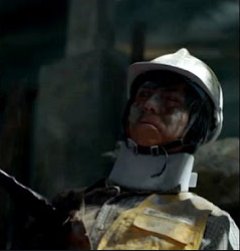 |
This is also because there is a risk that when something is skewered like this (and Kang Mo Yeon, played by Song Hye Kyo, mentions this too) that it could be a risk to nerves. Your nerves are very thin, very easily damaged; a small nudge as you pull something out could lead to paralysis in the limb, the spine, etc.
Please, if you have ever been "skewered", have something stuck in you, even just a nail in the bottom of your feet - seek medical assistance and allow the professionals to deal with it.
Also, the professionals will give you a shot to deal with whatever nasty illness you may succumb to from a rusty nail or the like.
Ugh, hand washing. Let's go through it.
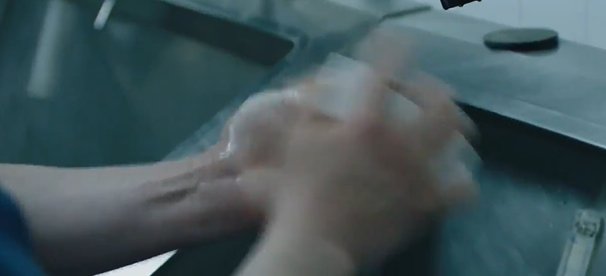 |
In this opening scene of the first episode of Netflix drama Life, neurosurgeon Doctor Joo Kyung Moon (Yoo Jae Myung) can be seen scrubbing his nails with soap as he preps for surgery. This is the correct way to prep for surgery.
In fact, there are countless instances throughout medical dramas where the surgeon will wash their hands but won’t go near their nails – this is negligence. If a doctor has a piece of dirt under their nails, and their gloves rip through over their nails, and that dirt gets into a patient, it can kill them. This is also why fake nails and nails with things such as gems are not allowed for surgeons, doctors, nurses, or any medical staff who may be around an open wound.
If someone close to you dies after surgery and you find out its due to the surgeon not cleaning their hands correctly, you are entitled to sue for medical negligence (depending on your country).
Now really think about how many dramas you've seen actively make an on-screen habit of cleaning the under of their nails. Or washing up to their elbows and then not touching anything? Can't really think of many others? I've watched 20 especially for this article, and honestly, Life is the only one I can think of that actively does this.
If you think it's just dramas that get it wrong - you'd be wrong. In 2013, a team from Michigan State University found, on average, only 5% of people wash their hands correctly.
The correct way to wash your hands can be seen below:
 |
You can read a full and coherent explanation of how and when to wash your hands by the CDC here.
Seriously, people, wash your hands. There's a new virus going around on the same level as Ebola, called Corona Virus or Covid-19. Keep yourself clean and be careful as it starts progressing around the world. (And, honestly, a lot of people find when they start washing their hands "correctly", you likely catch fewer colds during the winter months, or those random stomach bugs will lessen in the amount you get them. Look after yourself, you only get one body and one immune system. I've been washing my hands the correct way for 7 years; I've been sick three times in those 7 years, versus sick every 2-3 months when not washing them properly.)
Thirdly, CPR.
Oh boy, have drama and films absolutely ruined the public idea of CPR.
 |
In this part of Ouran High School Host Club (yes, not a medical but, let's talk about this) Suoh Tamaki (Yamamoto Yusuke) has collapsed and is in need of CPR. The Hitachiin twins, Kaoru (Takagi Manpei) and Hikaru (Takagi Shinpei) provide it and shortly after, Tamaki wakes up. (Okay, yeah, wrong move choosing Ouran Host here, but it was hard to find gifs that clearly showed this.)
No, no, nooooooooo. This is not how CPR works, folks - at all. In fact, dramas and films have made "how to do CPR" so diluted and incorrect in the public mind, here is a 911 operator guide on how to correctly give CPR:
CPR in real life is NOT the same in any way as films/dramas, etc. 99% of the time, people will not just wake up after a little while of CPR. CPR is done because the heart is not pumping; this means that the brain is not getting oxygenated blood, and it is dying. CPR is to provide the heartbeat – when you do CPR, you are that person’s heart for them.
Please spend some time on YouTube and watch videos to learn how to do CPR properly before you need to use it. Also please look up how to do CPR on an infant/child; for adults, you use your whole hands, for infants/babies – ESPECIALLY babies – you use TWO fingers. A baby’s heart is not as strong as an adult's; when using an entire hand, you can literally pop their heart. Please do NOT attempt CPR on an infant/baby if you aren’t sure how to do it.
If possible, try and do a first aid course. These are all tiny things you can learn that could literally save someone’s life (hopefully, they’ll never be needed, but it’s always best to know it just to be on the safe side).
If you are unsure of any of these steps, only do as the 911/etc operator advises you.
Some of these steps in these videos are a tiny bit outdated, so for these videos, please only take into account the method of applying CPR only (aka hand rhythms, positioning, etc.).
Only do CPR if you are one hundred percent sure that the person’s heart is not beating.
1) Call 911/999/etc. If you’re on holiday and aren’t aware of the emergency contact number, ring what you usually would (e.g. If American, dial 911). Most phones will automatically connect to the local emergency number)
2) Put your phone on speaker, place it next to you as it rings. If you’re 100% sure their heart is NOT beating, start providing CPR, more gently than shown in the videos. Enough to get the heart to pump but not cause damage. Ensure that the heel of your hands is above their heart.
3) When the call connects, tell them where your emergency is. (I cannot, as an operator, stress how IMPORTANT this is. If the call disconnects, we will know where to send someone. EG. “I NEED HELP” “Where are you” “123 *disconnect*” vs “911, what is your emergency?” “123 Some Street, Random Village, Postcode if known” “What is your emergency?” “I'm *disconnect*” We know where to send someone)
4) Explain to the operator what is happening and that you’ve begun emergency CPR. The operator will either advise you to continue and help you keep a beat – at this point, use more force. If the operator gives you the OK, this means the person very likely needs CPR to live. If they say to stop, stop.
5) If told to continue CPR, continue. If you’re with other people, swap out every 3-5 minutes. Do not swap when you get tired, or you won’t have the strength to take over when someone else needs to swap out. If you’re alone, do this for as long as you possibly can. Bear in mind, CPR best needs to be done until the ambulance gets there – if this takes 2 hours, if possible, the CPR needs to continue for 2 hours until the paramedics get there.
6) If you feel a bone break, do not stop. Rib(s)/sternum fractures are relatively common, occurring in 30% of all CPR patients that wake up. Think about it – if you’re lying there slowly dying, would you rather someone break a few ribs and get you to the hospital, or stop because “I think a rib broke” and leave you there with your brain slowly shutting down and your chances of being resuscitated diminishing every 30 seconds?
7) When paramedics show up, do not stop CPR until the paramedics tell you to move back. If you stop for two minutes whilst paramedics set up their equipment, that’s two minutes the patient’s brain has gone without oxygen. Do not stop unless you are physically incapable of continuing, or you are told to stop.
It should also be noted that if CPR is started soon enough, as you apply CPR, someone can be vaguely conscious, watching you and can move around. Stop once. If their pulse stops, continue. Explain to them what you are doing and explain what is going on. If they're conscious, they can likely hear you but cannot speak. But do note, paramedics I know who have worked 20 years have seen maybe only 1-3 cases like this in their whole career. It is not very often this happens at all, but worth to note.
If someone is laying on their chest and you have to roll them to perform CPR, just roll them. The paramedics will just roll them and immediately start CPR, they won't worry about potential things like back injuries that could paralyse - the reason for CPR is to prevent brain death. Would you rather someone roll you and you live and can't walk, or they hover over you, and you lay there dying?
If you're seriously concerned about things like being sued, then only do this is directed by an operator/paramedic/etc.
If the patient is lying in the middle of the road, you are safe to drag them to the side before doing CPR. Do not perform CPR in the middle of the road, especially at night. If a car comes, there's going to be two patients instead of one.
If you're unsure about moving the patient and really don't want to, do your best to safely let cars know there is someone there. Do not run into the road to wave down drivers, etc. Park your car closer to the side of the road behind the patient (maybe a cars length between you and the patient) and put your hazards on. Do not block the road with your car; this can and has caused accidents before.
The best position is to always pull someone off the road, but only if it is safe for you to do so.
Remember, you're trying to get medical help to one person, you shouldn't be creating a second patient for the ambulance crew to find there.
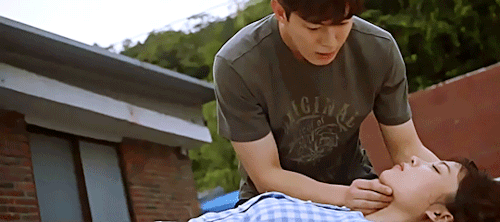 |
Here, in Witch's Love (yes, again, not a medical drama, but still relevant to this article), Kang Cho Hong (Yoon So Hee) is not breathing, so Hwang Jae Wook (Hong Bin) provides her with the "kiss of life"; this is where you force air into the lungs of someone who is not breathing.
Do not do the kiss of life. DO NOT DO THE KISS OF LIFE.
Point 8 in your guide of doing CPR:
Do not apply the kiss of life unless directed to by the person in charge, i.e., the operator, a doctor, etc. This is outdated and has since been advised NOT to do. If someone has (for instance) rabies, they spasm as you’re giving the kiss and they bite you – this can cause you to contract rabies. (There is no cure for rabies once it’s onset, and there are no symptoms once it is onset, seriously, do not risk it unless told to by a professional – on that note, if you ever get bitten by a wild animal or stray dog, or just a dog you don’t know… get the rabies shot. Trust me, you’d rather prefer a shot you didn’t necessarily need than the painful death of rabies.) Rabies is just one example, but there are countless potential risks like this that you are opening yourself to doing this.
Also, they may vomit, which you can then inhale, and start choking yourself - try and not become a patient yourself when applying first aid.
And last but not least - it was hard to choose just a few to include in this article - let's talk about car crashes.
So, I'm not going to dig into every tiny thing with car crashes and with a ton of different aspects of it, but for this one, I'm going to look at this one, one thing that will literally ruin someone's life if you did this in real life.
Now, we've all seen scenes, like this, right?
 (Gif, While You Were Sleeping, episode 2) (Gif, While You Were Sleeping, episode 2) |
It makes you jump, makes you gasp and you desperately hope for help, you pray the characters are okay.
Then this happens.
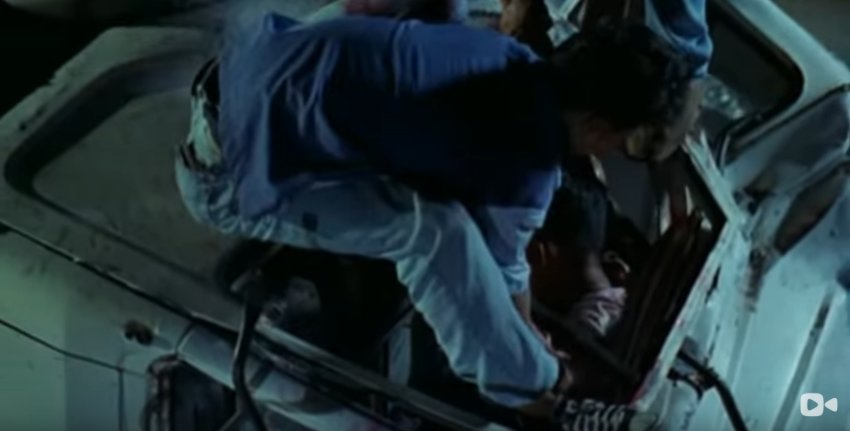 The Eye (2002) The Eye (2002) |
In this scene, some bystanders are trying to pull a man from a car after a large pile up on the road.
Do not pull people from the car after a car collision. If someone has any potential neck/back/etc. injury, do not move them. You can paralyze them for life.
The only time you should pull someone from a car after a wreck is if the car is going to explode/burn. Do not do this if you cannot do this safely. If the car is already burning, do not approach it. It can explode at any time.
If it's clear the car is going to explode, get the people out as soon as you can, and the moment it isn't safe to do so, stay well clear from the car.
If you are in a car accident, if your car is not going to explode, stay as still as you can. If you think your car is going to explode/can smell gasoline, get out if you are able. Get as far from the car as you can where it is safe, and you won't be hit by other cars, lay down, and stay still. Make sure someone there knows you are a patient and to send paramedics to you when they arrive.
The reason the fire department cut the cars so the patients can be lifted out is due to the severe risk of back/neck injury. If it is safe to stay in your car, stay there and let the paramedics and fire department do what they are trained to do to get you out safely.
Okay, fair enough, in The Eye they're pulling him out because a tanker full of gas is on its side and is likely to explode, but the point still stands.
This being said, if you have a child or baby in your car, use your baby/child on board signs.
Take these out when you are driving without your child.
These window stickers let paramedics know there is a baby/child in the car during the accident. A paramedic I know had a mother die on him as she didn't take her baby on board sticker down when her child wasn't in the car - he spent time making sure there was no baby in the back, due to the mother's inability to talk. She died whilst he was making sure there was no child in the car that needed immediate medical attention.
These signs are for your, and your child's, safety in the unfortunate event you crash.
Phew, there we are.
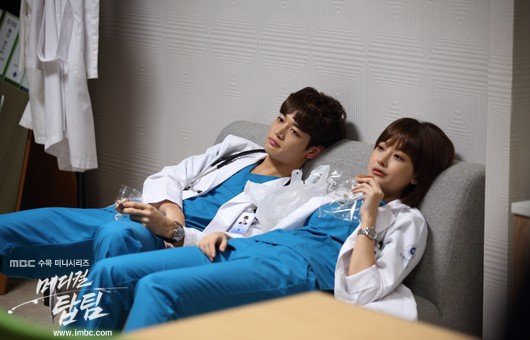 Medical Top Team (2013) Medical Top Team (2013) |
Not going to lie, it was a struggle to watch some of these just enough to see some of the scenes.
Here's your handy guide on what to do in situations, how to survive, and how not to fall victim to panic in situations. I sincerely hope none of you ever have to use this article, but I do hope should you ever find yourself in these situations, that this information comes back to you and you don't end up copying some of these bad mistakes.
And that's it from your "not so local exhausted" 911 operator! There's a lot of other things I could have put in this article, but I tried mostly to stick to the ones that were life-saving. There are tons more parts of this article I could do focusing on smaller, non-deadly things, or even some other topics (what the police do wrong in dramas, drug addiction in real life vs in drama world, etc.). |



